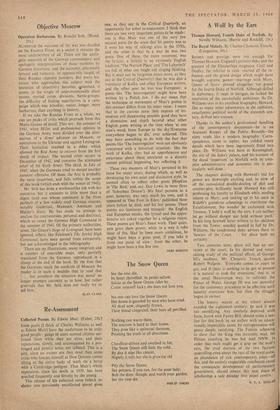Re-Assessment
Collected Poems. By Edwin Muir. (Faber, 25s.)
SOME poets (I think of Charles Williams as Well as Edwin Muir) have the misfortune to be truly good people: gangs of more normal citizens sur- round them while they are alive, and their reputations, slowly, and accompanied by a pro- longed and painful noise, are inflated. This is a pity, since no sooner are they dead than some critic who fancies himself as Don Quixote comes tilting at the entire body of work on a horse with a Cambridge pedigree. Thus Muir's whole reputation, since his death in 1959, has been assailed frequently and fiercely by the young.
This reissue of his collected verse (which in- cludes one previously uncollected piece) gives
one, as they say in the Critical Quarterly, an opportunity for sober re-assessment. I think that there are two very important points to be made: one is that Muir was one of the very few natural poets (in the sense that his poetry was as it were his way of talking) alive in the 1950s, and the other is that in a_ way he was two poets. One of these, the more recurrent, was the lyricist, a lyricist in an extremely English tradition. 'The Narrow Place' and 'The Labyrinth' are full of what one might call singing thinking. But it must not be forgotten (once more, as they say in the Critical Quarterly) that he was also a translator of Kafka and other European writers, and the other poet he was was European: a poem like 'The Interrogation' might have been written by a Polish Jew. 1 do not mean that the technique or movement of Muir's poems in this manner differs from his other verse: I mean that in the curious sense they express of im- mediate evil threatening possible good they have a dimension and depth beyond what other English poets writing at the time when 'at one Man's word, from Europe to the sky/Everyone everywhere began to die,' ever achieved. This may have something to do with the fact that poems like 'The Interrogation' were not obviously concerned with a historical situation: like the work of Kafka, they had an apprehension and awareness about them unrelated to a directly named political happening, but reflecting it.
These two manners of Muir's persisted in his verse for many years, during which, as well as developing his own quiet and distinctive style, he seemed often to reflect other poets (Hopkins in 'The Bird,' and, say, Day Lewis in verse three of 'Suburban Dream'). His final persona as a poet, however, was very much his own, and it appeared in 'One Foot in Eden.' published three years, before he died, and his last poems. These poems are luminous and tranquil: the English and European masks, the lyrical and the appre- hensive are yoked together by a religious vision. These poems are Muir's finest work. Their quiet- ness gives them power, while in a way it robs them of fire. Had he been more ambitious, he might have been a great poet, if you take it from one point of view: from the other, he might have been a less fine one.
DOM MORAES


































 Previous page
Previous page